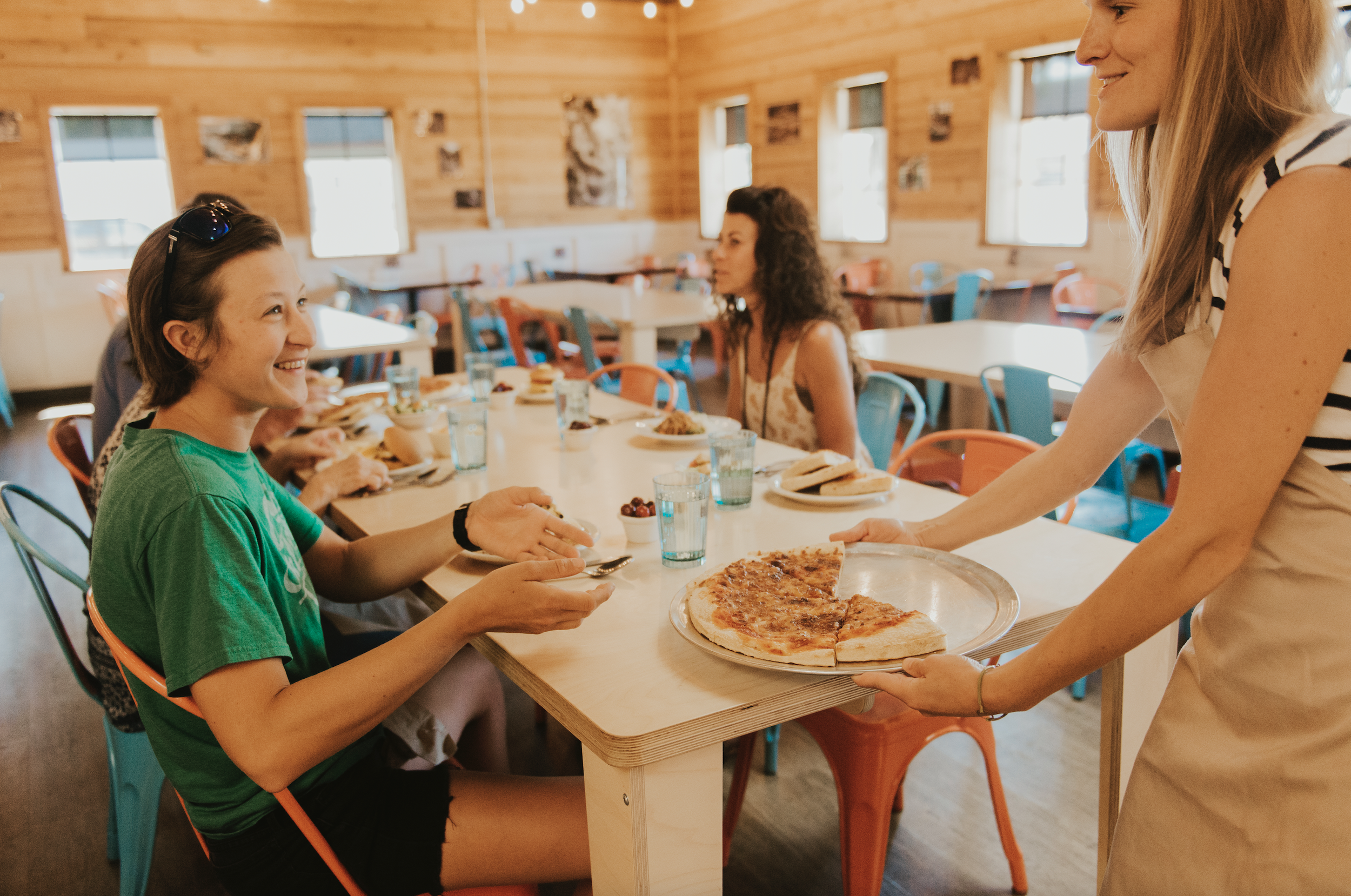
Generous Servings
By Kathleen Glockner
A Fork and Spoon in Every hand
How “good food does good” at Bozeman’s first pay-what-you-can social enterprise restaurant
I pick out a few voices rising above the conversational hum. A nearby pair is offering one another rides to the warming shelter. At the counter, a customer waiting in line steps aside to allow somebody in a hurry to order first. More tendrils of kindness join the warm buzz. An older woman in the corner reminisces about childhood Sundays: her mom would make a big meal and they’d all eat until their bellies were full—retiring to the living room afterwards to talk with one another. She says this restaurant reminded her of home.
Voted the number one, most-underrated thing in the valley—and the second-best place to volunteer by Bozeman’s Choice—the Fork and Spoon is Montana’s first and only pay-what-you-can restaurant. Serving 80 to 90 people per night with home-cooked, made-from-scratch meals, the Fork and Spoon offers a delicious experience for customers of any and all means––from those that can spend $200 on dinner, to those who can’t afford to pay at all. And if you can’t dine in, they do take-out orders!
The Fork and Spoon is a Human Resources Development Council organization that provides support to people struggling in the Bozeman community. The HRDC oversees many organizations: including the Fork and Spoon, the Gallatin Valley Food Bank, and the Streamline Bus service. It also provides services such as emergency housing, food and energy assistance, childcare, senior services, financial planning, and more.
I met with Jill Holder, the HRDC Food and Nutrition Director, to interview her about what the Fork and Spoon does, and to find out why it’s such a vital part of the Bozeman community. As we began our interview—seated in cheerful blue and orange chairs—I admired the hand-crafted décor, tasteful wall art, and cozy mood lighting.
“It’s good to reach out for help; that’s why services like this exist.”
- Jill Holder
Photo by Paige Schmitt
Holder started with the basics, explaining that the Fork and Spoon is predominantly donation-based. They’ve built strong relationships with local farms, so producers typically reach out to restaurant management whenever they’re interested in contributing. Meat steers are a frequent donation. They receive a lot of lentils too, since they grow well in this climate.
Using an innovative business strategy similar to that of LA Kitchen, Homeboy Industries, and Chrysalis, they’re able to serve the community by cycling all profits back into the restaurant. Twenty-seven percent of the Fork and Spoon’s income is generated by pick-up-the-tab sponsors, 22% from pay-what-you-can revenue, 23% from pay-it-forward donations, 23% from catering and space rental, and 5% from guest chef nights/fundraising events. To celebrate the enterprise’s 10th birthday, an anonymous donor has recently pledged to match every donation between Feb. 14 and April 25. The goal is to raise $10,000 in 10 weeks.
During COVID, Holder said that the restaurant transitioned entirely into a take-out service. The Fork and Spoon provided 25,509 hot meals, and delivered 7,170 meals to those needing food. Holder explained that they didn’t ask for donations during this period because, simply stated, “everyone was not doing well.” The pandemic turned lives upside-down. “Things seemed so much more desperate than they used to be,” she elaborated, “and everyone is doing their best. It’s good to reach out for help; that’s why services like this exist.”
The customer demographics speak volumes to Holder’s cause. She estimated that young people make up about 30% of their customers, while the remaining 70% is a mix of families and individuals experiencing homelessness. With these numbers in mind, Holder said they also manage workforce development “by employing individuals facing barriers to employment such as homelessness, recovery from addiction, or incarceration.” The Fork and Spoon doesn’t just exist to feed those in need, but also helps reintegrate them back into the Bozeman Community. Furthermore, volunteers are always appreciated.
“Serving 80 to 90 people a night with home-cooked, made-from-scratch meals, the Fork and Spoon offers a delicious experience for customers of any and all means––from those that can spend $200 on dinner to those who can’t afford to pay at all.”
- Jill Holder.
Photo courtesy of Fork and Spoon
As a social enterprise restaurant, the income generated from this pay-what-you-can model helps offset the cost of patrons who can’t pay. The catering and rental space is a for-profit initiative to fund the dinner service. Additionally, Holder reported that The Mighty Spork, a food truck making rounds in Bozeman, reinvests all income directly back into the Fork and Spoon.
Funded by a COVID business development grant, this mighty mobile kitchen first hit the streets in the summer of 2021. The truck performs a variety of roles: it’s a promotional tool that fosters community spirit, can be rented for social events, and functions as mobile outreach for food and nutrition programs. You can even hire the Spork to cater private events.
Both a pay-what-you-can and a for-profit initiative, The Mighty Spork travels to local festivals and markets to partner with companies and faith-based organizations. This mobile model ensures that everyone eats––even those lacking transportation in rural areas––while offering individuals easy opportunities to contribute to the Fork and Spoon, and by extension, the Bozeman community. The Mighty Spork can be found at the Gallatin Valley Food Bank every Thursday from 1-3:30 p.m.
After the interview concluded, I thanked Holder for her time and stayed for a meal. The food was magnificent. They gave me a hefty main course and a dessert: french onion soup, beef stroganoff, as well as a peanut butter and jelly dessert bar. I was stuffed.
The atmosphere in the Fork and Spoon is the kind of community and warmth you can’t understand merely by hearing about it; you must experience it yourself. It follows the goal Holder mentioned in our interview: to help people “have good nutritious food and be empowered at the same time.”


